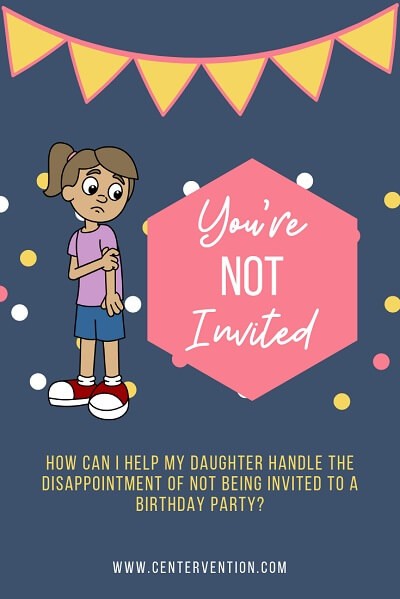
Q: My daughter was really upset when she came home from school today. At the beginning of the day, one of her classmates’ mothers distributed birthday party invitations to many of the students in the class. My daughter was left out. She has played with the other child before at school and in an after-school program they’re involved in and has never had any conflict with her. Now she’s sad and worries that there’s something wrong with her.
How can I help my child when she feels left out? How can I help her handle the disappointment of not being invited to a birthday party?
When your child feels left out, it’s painful
It can be heartbreaking to watch a child struggle with the hurt that comes when a friend or classmate hasn’t invited them to a birthday party or other event.
But, let’s face it, exclusion from any kind of gathering can happen at any age and for any reason. And, as kids get older and the class size grows from 10 or 12 in preschool to 25 or more in grade school, it will happen more often. Many families simply can’t afford or have the desire to host a party for two dozen kids.
Of course, that doesn’t make it any easier for the disappointed child and a concerned parent. And, as their child grapples with their feelings, parents may feel tempted to lash out at the other family for not inviting their child too. Experts caution against it.
“What kids need most is support, empathy and space from the problem,” writes Katie Hurley, a child and adolescent psychotherapist, in an article about social exclusion for the University of California at Berkeley’s Greater Good Magazine.
When their child is left out, parents can provide sympathy and emotional support. They also should take the opportunity to teach their child how to come to terms with their feelings. When kids learn to move on quickly after disappointment, they will gain the coping skills and resiliency that will serve them well throughout their lives.
When your child isn’t invited to a birthday party, here’s what experts recommend parents do.
Listen to them
Find out why they’re so disappointed. Is it because they don’t want to miss out on a trip to a trampoline park or swimming pool or because they thought the birthday girl or boy was a good friend?
“If missing the party is the issue, reassuring them that there will be other parties may be enough,” said Dr. Sharon Somekh, a pediatrician, parenting consultant, and founder of Raiseology.com, in an article on Fatherly. “If they are upset about the friendship, a lesson on how to improve their relationships can be helpful or arranging for a play date may help solidify the friendship.”
Build empathy
Remind them that they’re not the first person to miss out on a birthday party. “Talk about your own personal experiences,” said Brad Weinstein, co-author of “Hacking School Discipline: 9 Ways to Create a Culture of Empathy and Responsibility Using Restorative Justice,” “When I was a kid, this is what happened and here’s what I did when I found what mattered to me.”
Find their niche
If they don’t seem to be clicking with the kids at school, help them find their tribe elsewhere. For kids who aren’t interested in the usual kid pursuits of sports or music, parents may need to get creative. A video game fan might enjoy a coding class, for example.
“All you need is a couple of close relationships with peers,” said Weinstein, who also is chief innovation officer for BehaviorFlip. “Help your kid find what it is they are passionate about.”
And then, help them find peers who love the same things.
Keep your own emotions in check
“While parents should empathize with their kids in these situations if they want to help their children develop resilience, … they should ensure that their own response to the lack of invitation models resilience. If you as a parent are outwardly crushed that your child was left out, then your child will understandably have a more difficult time handling his own emotions about the incident.”
Dr. Sharon Somekh, a pediatrician, parenting consultant and founder of Raiseology.com, via Fatherly
Teach a lesson about friendship
“Liking someone a lot and not having those feelings returned on the same level is hard at any age. Your girl should know that although she should do her best to be friendly to everyone, friends fill a special role in our lives—and that the depth of those relationships, and the time it takes to foster a real friendship sets those people apart from others.”
Andrea Bastiani Archibald, a developmental psychologist and chief girl and family engagement officer for the Girl Scouts of the USA
Chart their friendships
“Making a friendship tree is a great way to help kids realize that they have many different friends in life. Just as family extends beyond the people living in your home, friendships blossom in a variety of contexts.
“Start the tree with the friends your child knows the best (even the ones she doesn’t spend much time with), but cue your child to think about friends made in sports, through religious organizations, in extracurricular classes or even at your local park. In filling the branches with friends from a wide variety of settings, [children] learn to focus on the positive relationships in their lives. When kids see that they have more friends than the people sitting at their lunch table, they are empowered to strengthen those other branches and even add new ones by trying new clubs, sports, or activities.”
Katie Hurley, a child and adolescent psychotherapist and founder of Girls Can!, via Greater Good Magazine